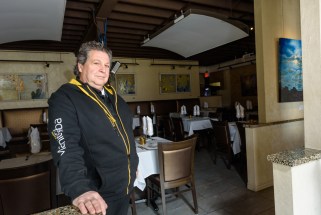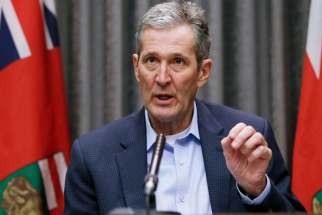Dispatches from the front Courageous, dedicated Winnipeggers serving as foot soldiers in the global war against COVID-19 are providing essential services their families, friends and neighbours need to stay safe and healthy
Read this article for free:
or
Already have an account? Log in here »
To continue reading, please subscribe:
Monthly Digital Subscription
$0 for the first 4 weeks*
- Enjoy unlimited reading on winnipegfreepress.com
- Read the E-Edition, our digital replica newspaper
- Access News Break, our award-winning app
- Play interactive puzzles
*No charge for 4 weeks then price increases to the regular rate of $19.00 plus GST every four weeks. Offer available to new and qualified returning subscribers only. Cancel any time.
Monthly Digital Subscription
$4.75/week*
- Enjoy unlimited reading on winnipegfreepress.com
- Read the E-Edition, our digital replica newspaper
- Access News Break, our award-winning app
- Play interactive puzzles
*Billed as $19 plus GST every four weeks. Cancel any time.
To continue reading, please subscribe:
Add Free Press access to your Brandon Sun subscription for only an additional
$1 for the first 4 weeks*
*Your next subscription payment will increase by $1.00 and you will be charged $16.99 plus GST for four weeks. After four weeks, your payment will increase to $23.99 plus GST every four weeks.
Read unlimited articles for free today:
or
Already have an account? Log in here »
Hey there, time traveller!
This article was published 27/03/2020 (2088 days ago), so information in it may no longer be current.
At a time when many Winnipeggers are working from home or have lost their jobs due to the COVID-19 pandemic, front-line workers are reporting for shifts under difficult, often frightening, circumstances.
The pandemic has changed the way they do their work and interact with customers and clients, and it’s made the concept of social distancing a sudden priority in fields where it had never before been a concern.
At the same time, others are seeking new ways to conduct business, with some delivering products and services they previously did not.
The Free Press caught up with several of these people to offer a glimpse into the new reality of their work.
Women’s resources provider
Lorie English, executive director of West Central Women’s Resource Centre
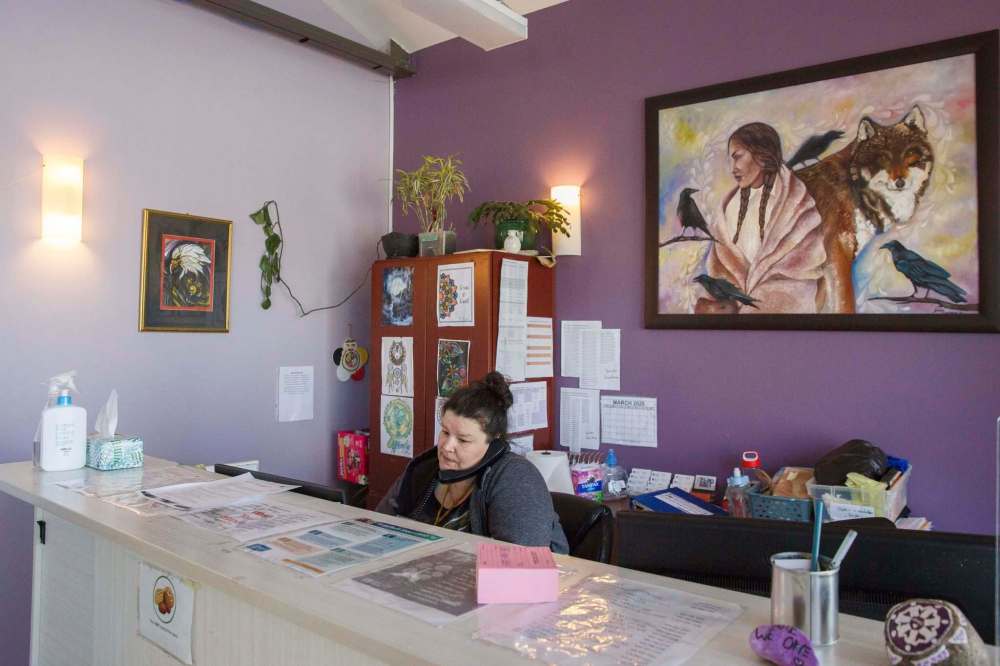
The West Central Women’s Resource Centre usually has an open-door policy. But right now, you have to buzz to get in.
It’s one small change, but it’s an apt metaphor for how even the most basic functions of the centre — which provides vital support to hundreds of women each week — have shifted, says executive director Lorie English.
“This is beyond everyone’s wildest imagination,” she said. “It’s pushing us to be creative.”
Daily drop-in meals are now being served in takeout containers. Much counselling work, normally done in person, is being conducted over the phone. Emergency counselling is still being conducted in person, but the support workers sit two metres away.
Only five women are allowed into the drop-in space at a time, a significant change from the usual dozens finding community with each other. All group programming has been cancelled.
As layoffs and financial instability increase, the demands on the centre — for food, laundry, showers — are anticipated to grow. But it is far from business as usual for the staff of 31, even though funding is secure and no one has been laid off.
“This is not how we ever thought we’d be delivering service,” English said. “Having to (change) these services is a tough choice. But we know we’re doing it for their safety and for ours, as well.”
A priority for the centre is being a low-barrier access point for women, and with other community organizations and non-profits reducing services, English said the centre can’t afford to slow down.
“We’re working really hard to be one more door that doesn’t close,” she said.
Medical student
Juan Mohadeb, second-year at University of Manitoba Rady Faculty of Health Sciences
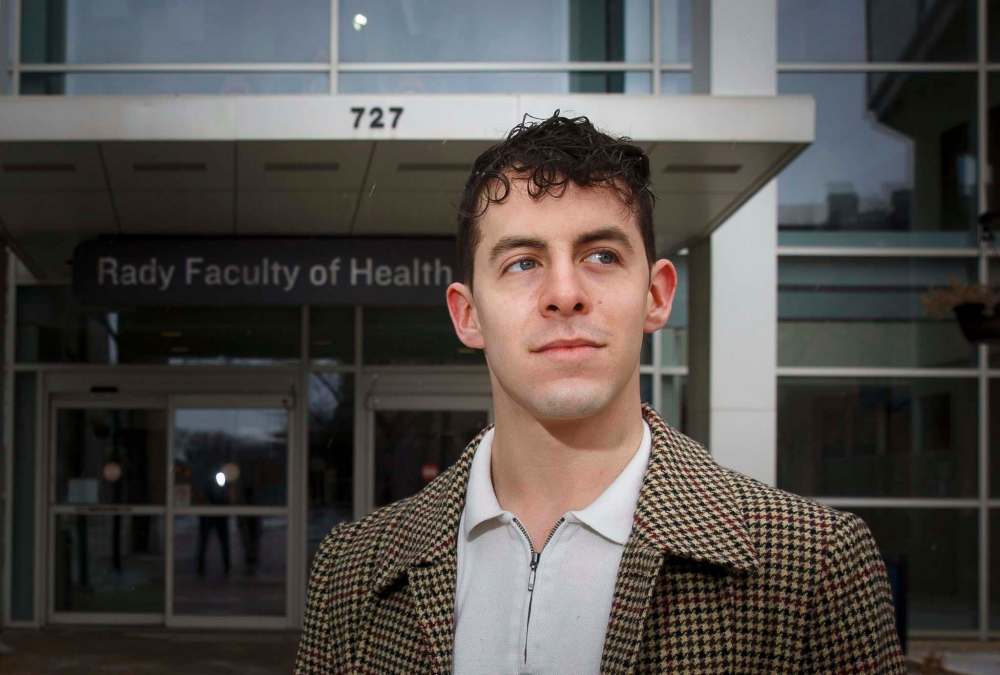
Medical school prepares students to become part of the health-care workforce of the future.
Juan Mohadeb didn’t expect the future would arrive quite this quickly.
He, along with hundreds of other medical, nursing, dental and therapy students, was thrust into the health-care system two weeks ago when the call for student volunteers was issued; within hours, all the spots were filled.
Mohadeb has worked shifts screening patients for entry at testing sites. And he’s also been on the door at Health Sciences Centre, explaining to people planning to visit patients or accompanying people going to appointments they aren’t allowed inside.
In the classroom, and in group sessions with doctors, Mohadeb said everything has seemed very structured. He’s now learned first-hand that even that rigid structure has to be able to adapt during times of uncertainty.
When the call for volunteers went out, Mohadeb felt exhilarated. Over time, he said some students have begun to feel anxious, providing another valuable experience.
“We all took an oath,” he said. “This is what health care is, and because of the knowledge you have and the responsibility you’ve accepted, there is a certain risk you’re expected to take as a health-care worker. Even as a student that’s true.”
Early childhood educator
Kayla Mauricio, inclusion and outdoor program supervisor at Seven Oaks Day Care Centre
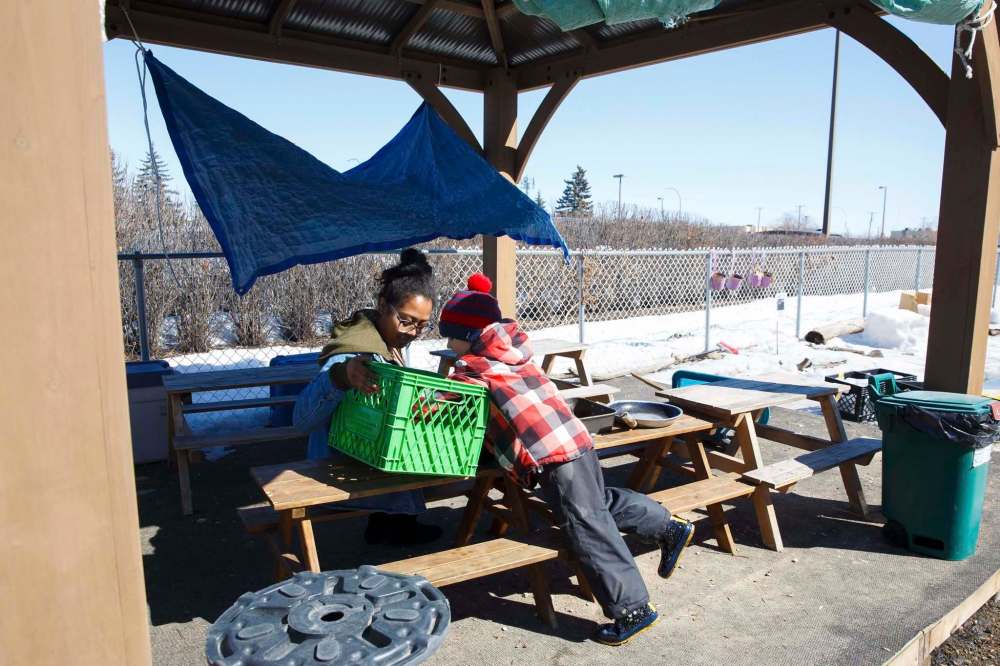
A brother and sister dropped off at the Seven Oaks Day Care Centre Wednesday morning played outside, painted rocks and listened to stories. They were the only two kids there.
Three weeks ago, there were 110 children at the centre, which also had a long wait list of families hoping for spots to open.
“Everything about this is weird,” Kayla Mauricio said.
Earlier in the month, the province announced operating grants would be extended only to centres that stayed open, then doubled back, calling facilities “essential” and guaranteeing funding even for the ones that closed their doors for the next month.
Seven Oaks decided to stay open before that change, said the facility’s executive director, who didn’t want her name published.
“We felt like we didn’t have a choice,” she said, adding the province needs to increase the grants to address the crisis. Her centre gets $35,000 per month, and with virtually no parent fees, that doesn’t stretch too far. She fears she may have to close the centre.
But for now, the work continues.
Staff are busy cleaning and disinfecting, while still maintaining quality care. “We still believe in giving these children the care they deserve,” Mauricio said.
The siblings at the centre Wednesday are age two and four, so they can’t fully grasp what’s going on, Mauricio said. “We just remind them it’s going to be like this for a little while, and we need to stay safe,” she said.
But physical distance is antithetical to early childhood education. For rock painting, each child had a set of supplies and sat at opposite ends of the table, as opposed to sharing.
“Having to keep children at length from each other and us, it goes against everything we believe children deserve,” Mauricio said. “It feels unnatural. We have to make do, but it puts the team in a whole other shifted perspective.”
The executive director hopes the situation has shifted the province’s perspective as well. “They’re relying on us as an essential service,” she said. “They’ve never respected us until this time. Where was that respect all the other times we’ve needed it?” she asked.
Postal worker
Jeremy House, rural suburban mail carrier
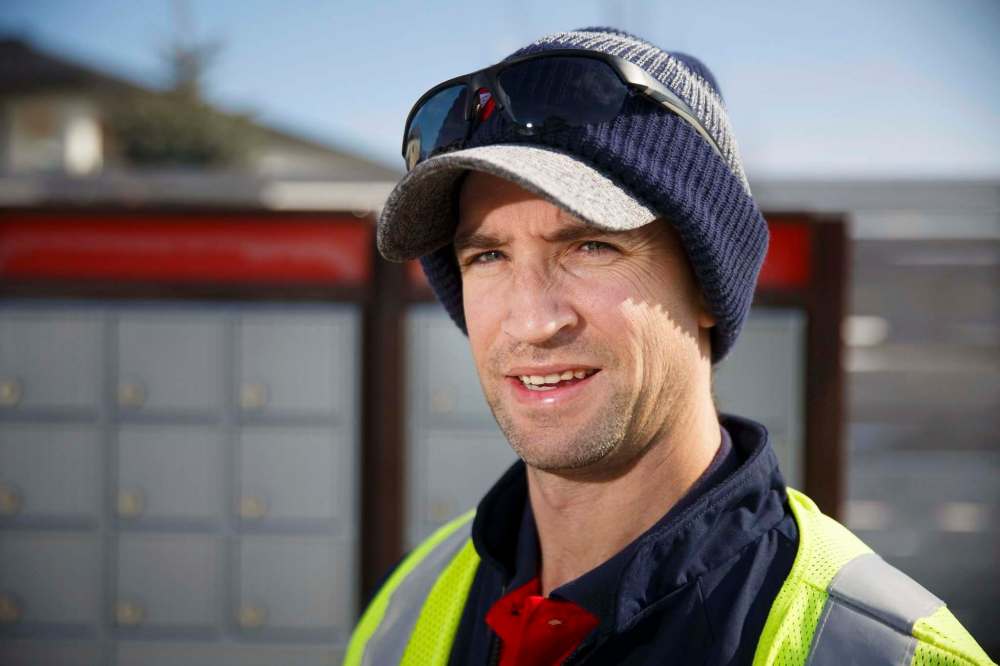
He delivers when it rains. He delivers when it snows. And the last few weeks, Jeremy House has delivered during a global pandemic.
The rural suburban mail carrier starts his day by going to the Canada Post northeast depot at Panet Road and Nairn Avenue. He goes to the parcel cart — a little less than a metre wide and a metre deep — and sorts through the letters, packages and parcels.
About three or four carriers show up to the cart at the same time, which has never really been much of a concern. But while going through the cart, House has been much more aware lately how close he and his co-workers are to one another.
House then leaves the depot in his Dodge Grand Caravan, to deliver the mail to houses, businesses, apartment blocks and community mailboxes in southeast Winnipeg.
Canada Post has implemented changes to how it delivers. Hours at offices have been reduced, customers are encouraged to use card tap for transactions and parcels left at the office for pickup won’t be returned to their senders.
For carriers such as House, Canada Post has implemented a “knock, drop, and go” approach. And whereas it’s normally courtesy to say hello to your carrier, or exchange a few pleasantries, that’s currently not recommended: customers are supposed to maintain a safe distance.
For House, who’s been a carrier since 2017, deliveries to stand-alone homes are simple, and mail to businesses has dwindled. His real concern, if he has one, is apartment buildings and community mailboxes, where dozens of people often pass while he’s stuffing parcels.
In a building with 65 tenants, he could be standing at the mailboxes for 15 minutes.
“Before all this, I would always talk to people in the hallway,” he said. “Now I’m doing my best to keep to myself.”
He asked for a mask, but was told none were available. Gloves were, however, and he has some.
After leaving each building, he uses sanitary wipes to clean his hands and his steering wheel before heading off to deliver his next packages.
Food courier
Scot McTaggart, owner of Fusion Grill
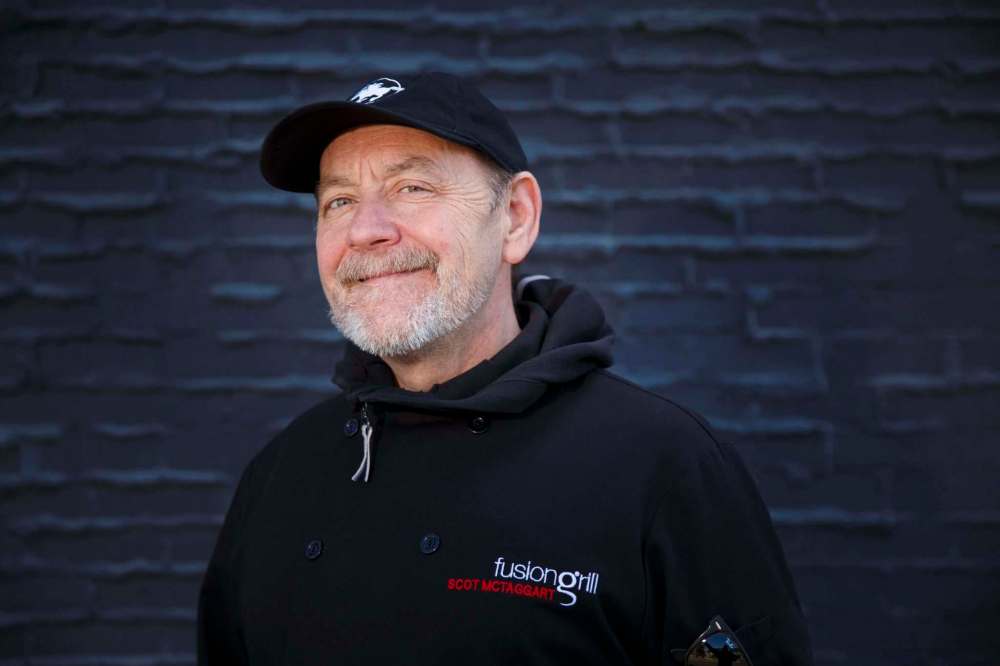
Scot McTaggart usually enjoys chatting with diners about their meals, detailing where certain ingredients come from and, when possible, who grew them.
But since COVID-19 emerged in Manitoba, the owner of Fusion Grill has had to give up that face-to-face interaction with restaurant guests and switch to delivery and takeout service instead.
This week, he began taking orders through Skip the Dishes and leaving the meals at doorsteps, keeping his distance from customers.
“Our industry is one of the few industries where you can create something, sell it and get feedback on it in a very short period of time,” he said. “So that feedback is the part that’s missing, from that interpersonal aspect.”
McTaggart closed his restaurant last Saturday and began delivering food on Tuesday. While he misses talking to guests, he’s grateful many customers have promised to order often to support the new business model.
“People are coming to us and saying ‘We want you to be there when we get out of this, so we’re going to order every week.’ That is so motivating,” he said.
McTaggart said one customer blew a kiss from her window instead of saying thank you at the doorstep and another called him on the phone as he drove away, making the transition a little easier.
However, he’ll need to soon reassess if dine-out orders are enough to sustain the business.
“We’ll go to the end of this week and we’ll take another look at (whether it is) worthwhile to stay open for takeout and delivery,” he said.
McTaggart said he’s encouraged by two pre-orders for virtual extended family dinners, where the guests plan to connect through Skype instead of gathering at one home.
“I’m saddened because a table for me is a meeting place…. But here they are trying to do all of those same things under these very trying circumstances. I thought it was pretty cool,” he said.
Winnipeg Transit driver
Terrified about the possibility that an invisible threat could be on board his bus, a Winnipeg Transit driver, who asked that his name not be published, said he is constantly concerned about the risk that he’ll be exposed to the coronavirus at work.
And that new pandemic risk is taking place, he said, alongside longstanding issues, such as assaults, continue.
“Incidents involving violence against passengers and against drivers have not abated. We’re having to contend with both the visible and the invisible threat,” he said. “To be frank, it’s quite frightening.”
Drivers have long complained that they have been hit, kicked and spat on during their duties, or worse. The city began installing safety shields on buses earlier this year to help combat the problem.
“Incidents involving violence against passengers and against drivers have not abated. We’re having to contend with both the visible and the invisible threat.” – Winnipeg Transit driver
The driver said many aspects of his routine have changed since the first cases of COVID-19 were detected in Manitoba.
He’s now considering buying his own protective gear, such as a mask. He remains alert throughout breaks to ensure he keeps at least a two-metre distance between himself and others.
And he cringes every time someone coughs or sneezes.
“Now every cough and sneeze is almost more threatening than someone shouting ‘fire!’ in a crowded theatre,” he said.
The driver said he hopes Winnipeg will soon adopt fare-free riding and allow passengers to enter and exit buses through a rear door to reduce the risk virus transmission.
“On a busy day, 200 people are touching that fare box,” he said.
Grocery store clerk
Radhi Chauhan, Dino’s Grocery Mart
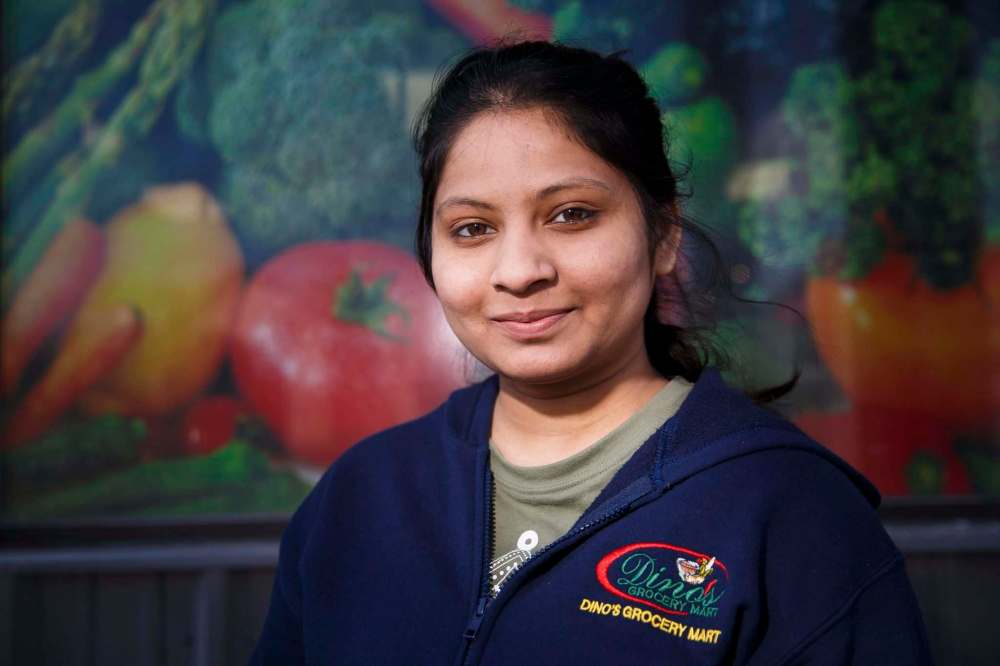
Radhi Chauhan says she was worried about the risk she would face at work.
But she said she feels fortunate that several changes have since taken place to protect her, co-workers and shoppers.
“It’s (a) danger. We are hearing news that people are dying because of the virus, so we are quite afraid of that virus, but we are taking precautions (so) I don’t have any fear to work here,” she said.
Chauhan said the store recently installed new plastic shields to separate clerks from customers. She also wears gloves at work and says employees remind shoppers to keep their distance from each other.
In addition, she said staff are also sanitizing carts and baskets each time they’re used and cleaning the cash register constantly.
“It’s going to protect ourselves and the customers,” Chauhan said.
Rajan Varma, a store manager who fills in as a clerk sometimes, said he’s considering making the barrier a permanent feature, since it could also protect against the spread of colds and flu.
“As a cashier, (I) feel safe in that respect because it’s always maintaining… distance between the public and the cashier, so it’s actually helping us out,” said Varma.
Health-care aide
It has been quieter than usual for the past few days, but she doesn’t expect that to continue.
And the aide at a Winnipeg hospital — who didn’t want to be identified — said she hopes any increased demand is paired with new shipments of protective masks and hand sanitizer.
The relative quiet is a result of less traffic in the facility; people who don’t need to be inside the hospital are staying away or being turned away, and that helps her feel a bit safer.
“People have really followed the advice of the government and they just stayed home and self-isolated,” she said. “I feel grateful that our community is following the recommendations of the government.”
“The hazard pay would be nice for us to gain. We’re doing our jobs to care for the community but also we still have to come home and (care for our) families.” – Health-care aide
The health-care worker says that resulted in fewer patients and more empty beds in recent days, which she hopes will help ensure hospitals can cope with the anticipated rise in COVID-19 patients who will need care.
But she is concerned about global shortages of vital personal-protection gear.
“It’s about us getting more supplies.… Hypothetically, if there would be a huge wave, we don’t want to get to the point where we don’t have them anymore,” she said.
The health-care aide said she washes her hands often to reduce her risk.
She also believes health-care aides should be entitled to a pandemic pay increase; some supermarkets have raised hourly pay for front-line workers at greater risk.
“The hazard pay would be nice for us to gain. We’re doing our jobs to care for the community but also we still have to come home and (care for our) families,” she said.
Truck driver
Wally Lumley
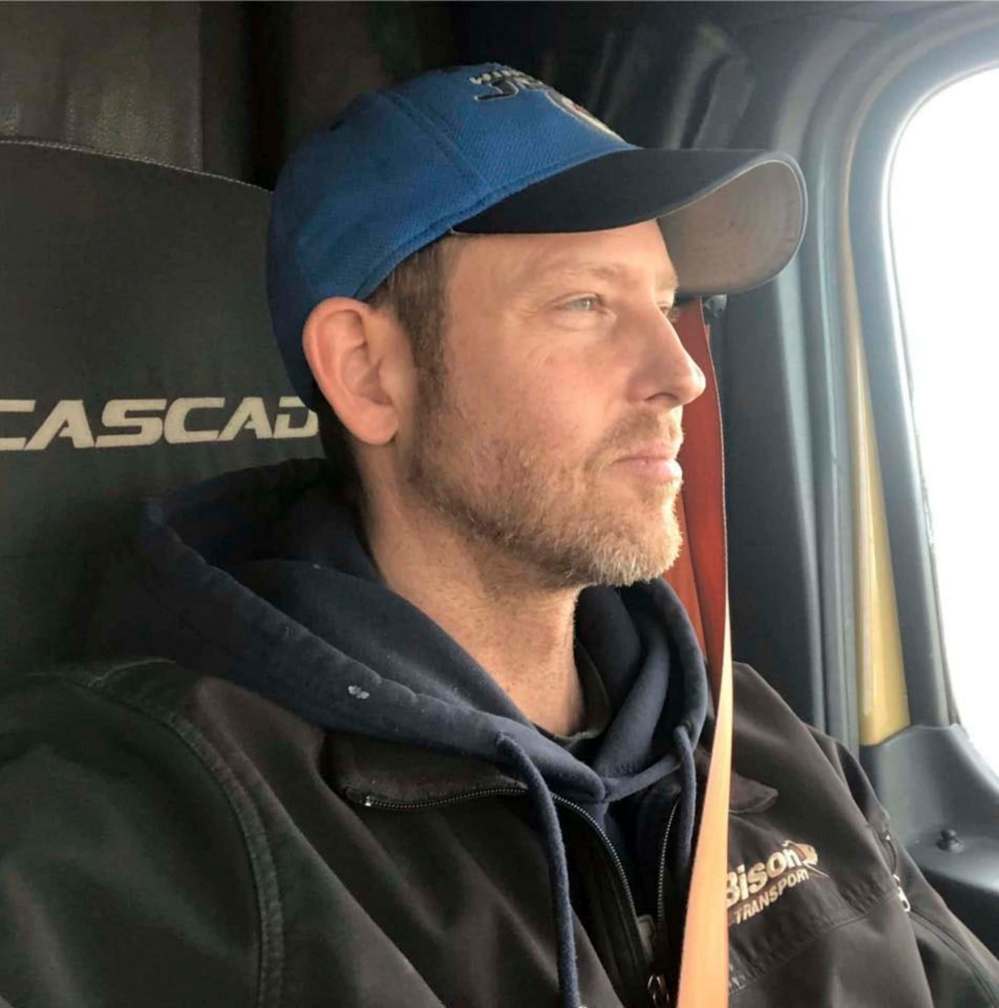
If the wheels aren’t turning, Wally Lumley isn’t earning.
Which is a good thing for Canadians, because Lumley and his colleagues at Bison Transport are ensuring communities have access to the goods they need during the pandemic.
“It hasn’t really impacted my work. If anything, for those of us on the road, the work is there because people need these essential goods to be delivered,” he said.
“But there is some worry when you do need to stop, at a truck stop, or you’re making switches with your trailers. You don’t know when you’re coming into contact with someone out there and who’ve they’ve been around or what they’ve been exposed to.”
From Sunday night to Thursday, Lumley does two overnight trips to Maple Creek, Sask. It takes him about an hour to prepare his truck to leave, then he drives 10 hours before resting.
He has to pull over to check on his truck every two hours when he’s on the road.
“I consider myself fortunate. Especially now, with this pandemic going on, there are so many people facing very uncertain times financially, with work, with layoffs. I consider myself very fortunate to find myself in an industry that’s considered essential,” he said.
“I listen to a lot of talk radio while on the road. It helps keep me informed on what’s happening. There are a lot of people calling in and talking about what they’re going through.”
Lumley said he has noticed a sharp decline in the number of cars on the road. However, he said he sees the same amount of trucks as he did before the pandemic.
Switching off with other drivers and taking breaks at truck stops could pose a potential for exposure, but Lumley said he’s not overly worried.
“The heroes are the nurses, the doctors, the people who are really in the thick of things,” he said. “But it has been kind of nice in the last couple of weeks, I have noticed a greater appreciation from others for what we’re doing out here.”
Paramedic
Ryan Woiden
It’s the calm before the storm. That’s how the city’s paramedics feel as they prepare for the pandemic to grip Winnipeg.
“We’re trying to calm each other’s nerves. We’re just trying to be prepared to go out there and make people feel safe and get the job done,” said Woiden, president of the Manitoba Government and General Employees Union Local 911.
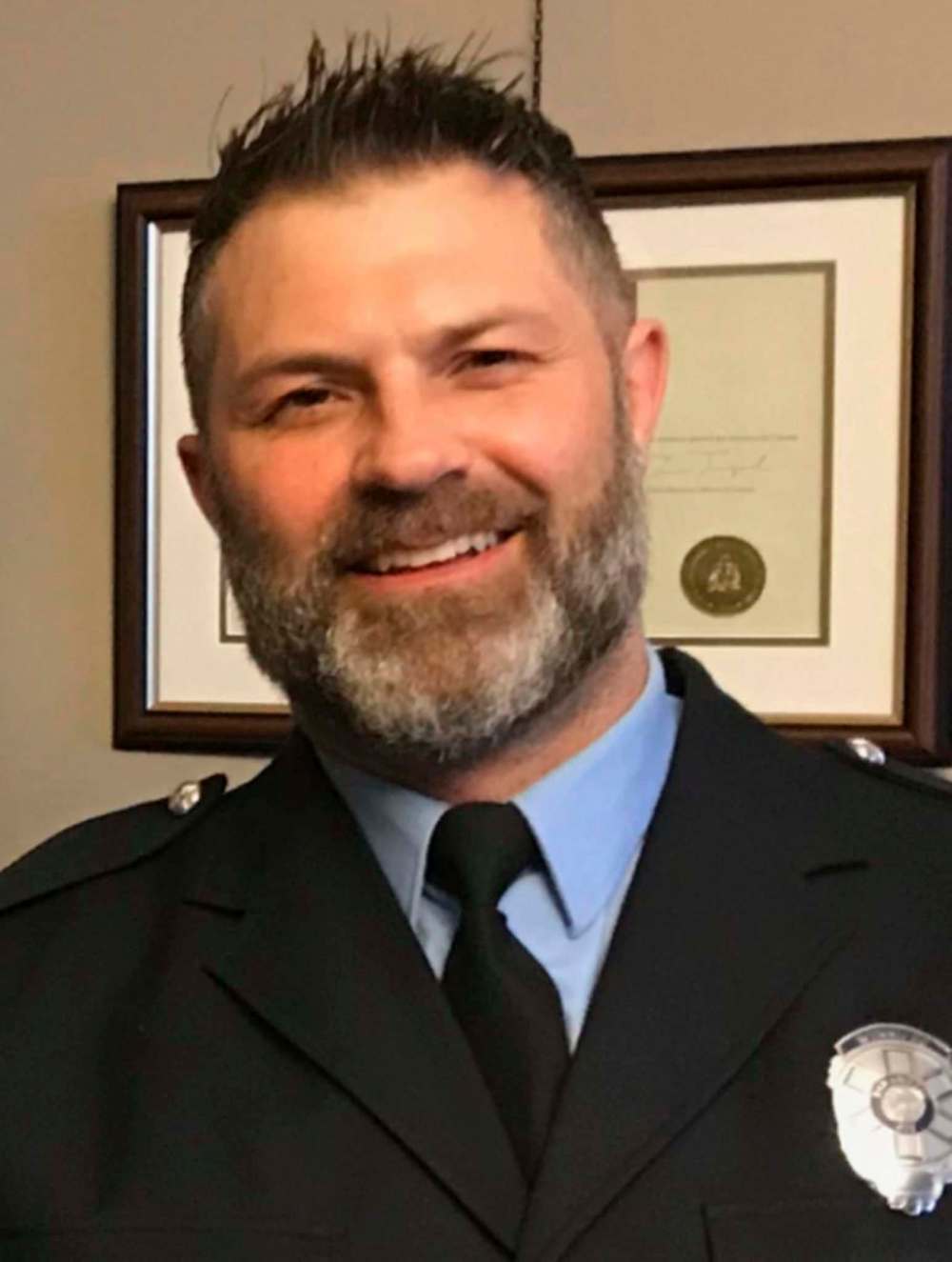
“There’s a definite ‘bend, don’t break’ attitude out there.”
As president of the local, Woiden — an advanced-care paramedic with two decades of experience — said he’s been in contact with paramedics elsewhere to see how other emergency services personnel are handling the crisis.
“Now it’s breaching Manitoba and Winnipeg borders. There are paramedics that are scared and nervous. They’re scared, and they probably should be, because we don’t even really know what the hell this is,” he said.
“We’ve got families to return to, but we know this is the job we signed up for.”
Woiden said Winnipeggers can expect their interactions with paramedics to change; all calls will be treated as potential COVID-19 cases, he said.
When paramedics are dispatched to a home, they’ll knock on the door, drop masks, then take 10 steps back. Only at that point will they begin talking to patients and assessing them.
He said the goal, when possible, will be to keep people in their homes, rather than transport them to hospital.
Woiden served through past medical scares, including SARS and Ebola. However, he said he’s never seen anything like this.
“You can’t have a breach right now or people could die,” he said. “It sounds dramatic, but it’s the truth.”
ben.waldman@freepress.mb.ca
joyanne.pursaga@freepress.mb.ca
ryan.thorpe@freepress.mb.ca

Ben Waldman covers a little bit of everything for the Free Press.

Born and raised in Winnipeg, Joyanne loves to tell the stories of this city, especially when politics is involved. Joyanne became the city hall reporter for the Winnipeg Free Press in early 2020.

Ryan Thorpe likes the pace of daily news, the feeling of a broadsheet in his hands and the stress of never-ending deadlines hanging over his head.
Our newsroom depends on a growing audience of readers to power our journalism. If you are not a paid reader, please consider becoming a subscriber.
Our newsroom depends on its audience of readers to power our journalism. Thank you for your support.
History
Updated on Saturday, March 28, 2020 2:07 PM CDT: Fixes typo
Updated on Monday, March 30, 2020 11:23 AM CDT: Updates org name




